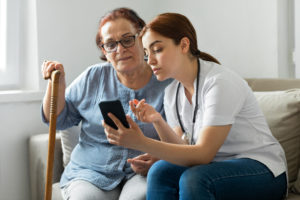By Mala Blomquist
As part of efforts to study the impact of Alzheimer’s disease and dementia disorders, researchers are looking for current caretakers of Alzheimer’s and dementia patients to see how they manage the stress of caregiving. According to an AARP study, 1 in 5 people in America, almost 53 million people, are unpaid family caregivers.
The Centers for Disease Control and Prevention calls these caregivers “the backbone of long-term, in-home care,” noting that while this role can be rewarding, it can also lead to negative health consequences. So, who cares for the caregiver? That’s where Linda Larkey, Ph.D., a faculty member and researcher at Arizona State University’s Edson College of Nursing and Health Innovation and the ASU CARES study team, comes in to examine how caregivers recharge physically and emotionally to keep going.

“The caregivers come into the study and then they experience these interventions to help them with their stress of the caregiving and the caregiving burden experience,” Larkey said.
The ASU CARES project is a completely online, nationwide study for caregivers ages 18 years and older who are caring for someone who is in any stage of dementia or Alzheimer’s. The project lasts for 13 weeks, participation is entirely voluntary and participants can earn up to $75 in gift cards.
Even though the project is randomized, Larkey said that everyone will get something of value out of participating. One intervention that they expect will be effective is a breath-focused technique and another involves listening to music.
Participants will also receive devices to help measure some of the things occurring within the neurophysiological system. “So it’s not just, ‘Do you feel like you think you might feel better?’ We have an objective measure that uses a sensor that works with the pulse and is able to detect things about how the autonomic nervous system is functioning,” Larkey said.
Larkey, who has been involved with cancer research for the past 30 years, has used some of these interventions before in a hospital setting with medical professionals. “I thought this would be really helpful for the person at home; this is just so simple, anybody can use it,” she said. “You can begin to work with your own practices and get feedback. So you can see how you’re doing and it’s only 10 minutes a day that we ask people to engage. But it begins to change your nervous system when you practice it.”
It’s a novel approach for the caregiving population, so the team was able to get funding through a seed grant for new research. Larkey has volunteer and part-time students in her lab and she stated that “an undergraduate student to learn how to follow the procedures of a research project is an extraordinary investment of time.”
Larkey noted that there’s a lot of research on helping those with dementia but the research has neglected the caregivers. “I’m working with my colleague Dara James, Ph.D. [co-principal investigator] and she’s moving more into work with Alzheimer’s,” she said. “So we decided to work specifically with the caregivers because that’s such an unmet need. Their stress is phenomenal.”
For more information, contact 602-496-2329 or [email protected].







